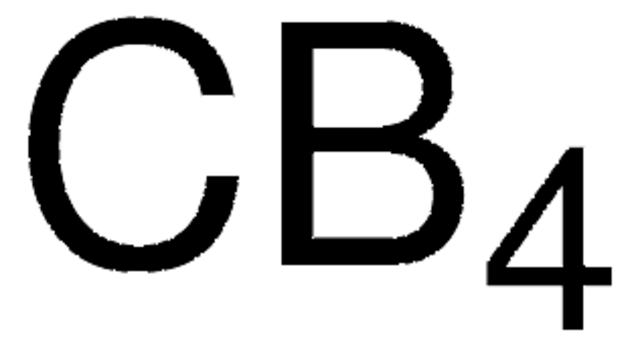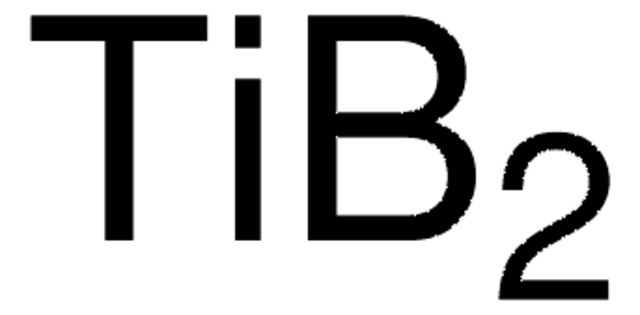266620
Boron
crystalline, 1 cm, 99.7% trace metals basis
Sinónimos:
B
Iniciar sesiónpara Ver la Fijación de precios por contrato y de la organización
About This Item
Fórmula empírica (notación de Hill):
B
Número de CAS:
Peso molecular:
10.81
Número CE:
Número MDL:
Código UNSPSC:
12161600
ID de la sustancia en PubChem:
NACRES:
NA.22
Productos recomendados
Nivel de calidad
Ensayo
99.7% trace metals basis
Formulario
crystalline
idoneidad de la reacción
core: boron
reagent type: catalyst
resistividad
1.5E12 μΩ-cm, 20 °C
tamaño de partícula
1 cm
densidad
2.34 g/mL at 25 °C (lit.)
cadena SMILES
[B]
InChI
1S/B
Clave InChI
ZOXJGFHDIHLPTG-UHFFFAOYSA-N
¿Está buscando productos similares? Visita Guía de comparación de productos
Categorías relacionadas
Aplicación
Boron can be used as a:
- Dopant on single-walled carbon nanotubes (SWCNT) used as a catalyst for acetylene hydrochlorination.
- Catalyst for enhancing the graphitization of various industrial carbons.
Código de clase de almacenamiento
13 - Non Combustible Solids
Clase de riesgo para el agua (WGK)
nwg
Punto de inflamabilidad (°F)
Not applicable
Punto de inflamabilidad (°C)
Not applicable
Equipo de protección personal
dust mask type N95 (US), Eyeshields, Gloves
Elija entre una de las versiones más recientes:
¿Ya tiene este producto?
Encuentre la documentación para los productos que ha comprado recientemente en la Biblioteca de documentos.
Apparent catalysis of graphitization. 3. Effect of boron
Murty HN, et al.
Fuel: The Science and Technology of Fuel and Energy, 56(3) (1977)
Single Au Anion Can Catalyze Acetylene Hydrochlorination: Tunable Catalytic Performance from Rational Doping
Ali S, et al.
The Journal of Physical Chemistry C (2019)
Tara A Devirian et al.
Critical reviews in food science and nutrition, 43(2), 219-231 (2003-04-23)
Boron may be an essential nutrient for animals and humans. Dietary boron influences the activity of many metabolic enzymes, as well as the metabolism of steroid hormones and several micronutrients, including calcium, magnesium, and vitamin D. Boron supplementation in rats
Yu Zhao et al.
Journal of the American Chemical Society, 135(4), 1201-1204 (2013-01-16)
Two kinds of boron and nitrogen co-doped carbon nanotubes (CNTs) dominated by bonded or separated B and N are intentionally prepared, which present distinct oxygen reduction reaction (ORR) performances. The experimental and theoretical results indicate that the bonded case cannot
Daniel L Silverio et al.
Nature, 494(7436), 216-221 (2013-02-15)
The discovery of catalysts that can be used to synthesize complex organic compounds by enantioselective transformations is central to advances in the life sciences; for this reason, many chemists aim to discover catalysts that allow for preparation of chiral molecules
Global Trade Item Number
| Número de referencia del producto (SKU) | GTIN |
|---|---|
| 266620-25G | 4061826133941 |
| 266620-5G | 4061833545782 |
Nuestro equipo de científicos tiene experiencia en todas las áreas de investigación: Ciencias de la vida, Ciencia de los materiales, Síntesis química, Cromatografía, Analítica y muchas otras.
Póngase en contacto con el Servicio técnico




